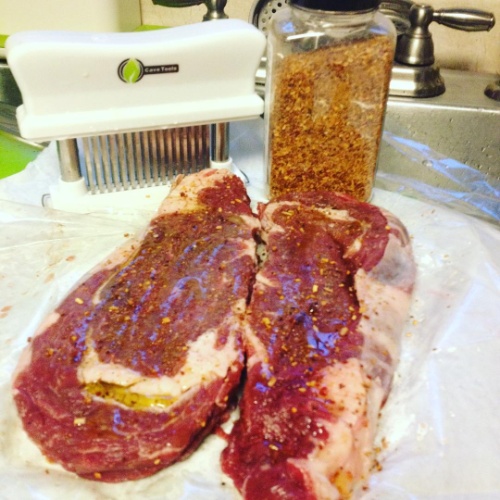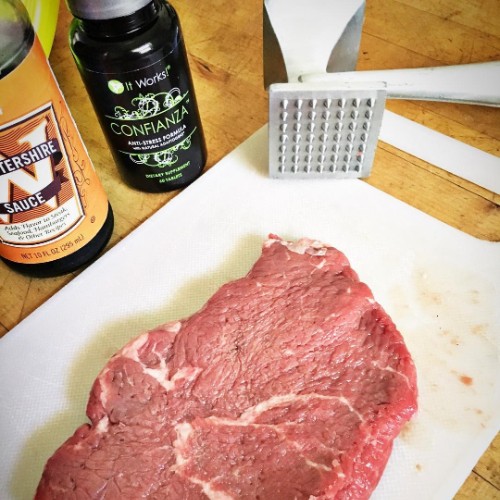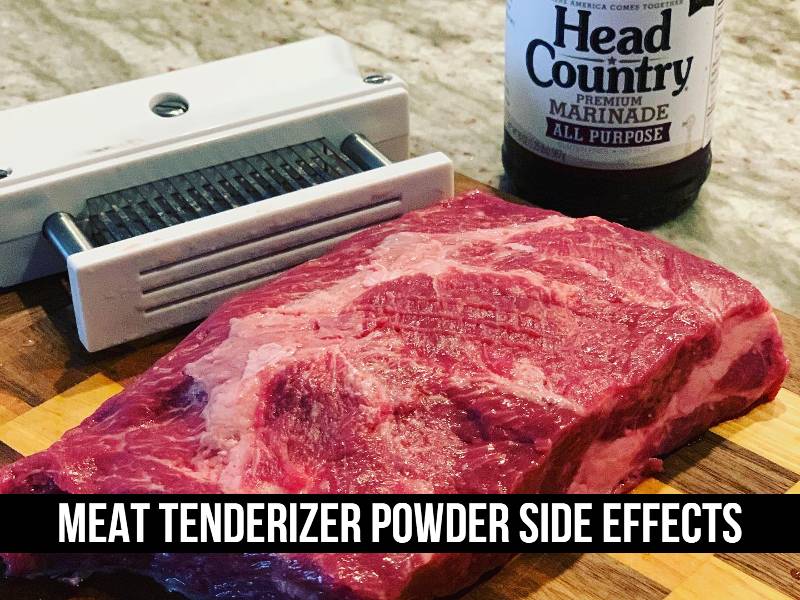As a food enthusiast, one of the most fun parts of cooking is trying out new recipes and ingredients. But, when it comes to some ingredients, it’s important to be cautious as they may have unexpected side effects. One such additive is a powder that tenderizes the meat.
The ingredient meat tenderizer powder is commonly used in cooking, particularly in marinades. It’s made from the papain enzyme and is used to break down the tough fibers in the meat to make it more tender. But, while it might make for a more delicious meal, it’s important to know the potential side effects of using it.
While the side effects of meat tenderizer powder are generally mild, they can still be unpleasant. In this article, we will explore the potential risks of meat tenderizer powder, and how to safely use it in your cooking.
What Is A Meat Tenderizer Powder?
A meat tenderizer powder is a seasoning or marinade that is used to soften and tenderize meat. Meat tenderizers typically contain enzymes that break down the proteins in the meat, making it more tender and easier to chew.

Some common ingredients in meat tenderizer powders include papain, bromelain, and ficin, which are all enzymes that come from plants. These enzymes can help to break down the tough connective tissue in meats like beef, pork, and lamb, making them more tender.
Meat tenderizer powders are often used on less expensive cuts of meat that tend to be tougher, as they can help to make these cuts more palatable. They can also be used on meats that have been overcooked or grilled for a long time, as the enzymes can help to soften the meat and improve its texture.
What Is The Purpose Of Using Meat Tenderizer powder?

There are several reasons why people use meat tenderizer powders:
To make tough cuts of meat more tender: As mentioned earlier, meat tenderizer powders contain enzymes that break down the proteins in meat, making it more tender and easier to chew. This can be especially helpful when cooking tough cuts of meat like beef chuck, pork shoulder, or lamb shoulder, which can be difficult to chew if they are not cooked properly.
To reduce cooking time: Meat tenderizer powders can help to reduce the amount of time that is needed to cook meat, as the enzymes in the powder work to break down the proteins in the meat. This can be especially helpful when cooking large cuts of meat that take a long time to cook, such as roasts or whole chickens.
To add flavor: Meat tenderizer powders often contain other ingredients, such as herbs and spices, which can add flavor to the meat. This can be especially useful when cooking less expensive cuts of meat, which may not have as much flavor on their own.
To improve the texture of overcooked or grilled meats: If you have overcooked or grilled a piece of meat and it is tough or chewy, a meat tenderizer powder can help to soften the meat and improve its texture.
To marinate meat: Meat tenderizer powders can also be used as a marinade to help infuse the meat with flavor and make it more tender. Simply mix the tenderizer powder with a liquid (such as water, oil, or wine) and marinate the meat for a few hours or overnight before cooking.
Side Effects Of Using Meat Tenderizer Powder
If you’re a fan of cooking with meat, then you may have considered using a meat tenderizer powder. Meat tenderizer powder is a helpful tool for reducing the toughness of meat, and improving its tenderness and succulents. However, using this powder also comes with some potential side effects that you should be aware of.
1. Enzymes Reacting with Oils or Cookware
The enzymes in tenderizing powder may react with the oils in your cooking or cooking utensils. This can be harmful for your health, as those oils may contain harmful chemicals that can cause irritation or other health problems.
2. Allergy Risk
Many meat tenderizer powders are made with either papaya or pineapple. Both of these fruits contain enzymes that help tenderize meat, but they can also cause an allergic reaction. If you’re allergic to either of these fruits, then you may suffer from swelling and pain in the mouth, itchiness, breathing difficulty, and other symptoms after the eating of meat that has been processed with enzymes.
3. Monosodium Glutamate and Sodium
Meat tenderizers often contain monosodium glutamate (MSG) and large amounts of sodium. Too much sodium can affect your cardiovascular system, and MSG can cause high blood pressure migraines, diarrhea, and flushing of the neck and face after consumption.
The Food and Drug Administration has classified MSG as a food ingredient that is regarded as safe. It is common for the signs and symptoms to go away on their own after some time.
4. Taste and Flavor
Tenderizers may also interact with different ingredients in a dish, potentially affecting its taste and flavor. This may not be a threat to health, but it’s important to keep it in mind before adding a meat tenderizer to a dish.
Overall, meat tenderizers can be a helpful tool for making meat more tender, but there are potential side effects to be aware of. If you’re going to use a meat tenderizer powder, make sure to read the ingredients list carefully and be aware of any potential allergies or sensitivities that you may have.
What Is Meat Tenderizer Powder Made Of?
Meat tenderizer powder is a great way to add flavor and tenderness to your favorite cuts of meat, and it’s made out of naturally derived enzyme powder.
The enzyme most commonly used in meat tenderizer powder is papain, which is derived from the papaya fruit. In addition to enhancing meat tenderness, papain breaks down proteins. Bromelain is another enzyme found in meat tenderizer powder, which is derived from pineapples. Like papain, bromelain helps digest proteins and tenderize meat by breaking them down.
To use meat tenderizer powder, simply sprinkle it on the meat before cooking. The enzymes will get to work breaking down the meat’s proteins, which makes it softer and flavorful. The powder can be added to marinades as well, for an extra boost of flavor.
It’s important to note that meat tenderizer powder should never be ingested. It is only meant to be used as an external seasoning and should be used sparingly.
Is it good to use meat tenderizer?
Meat tenderizer is a kitchen staple that can be used to enhance the flavor of your favorite dishes. It helps break down the tough meat proteins, making them more tender and easier to chew. It can also help tenderize tougher cuts of meat, such as steaks.
A popular way to tenderize meat is to puncture holes in the connective tissue. This helps to break down the proteins even further, making the meat more tender. This method also helps to allow the seasonings and marinades to penetrate the meat better. This is especially useful when preparing thick cuts of steak.
In addition to puncturing the connective tissue, you can also use meat tenderizer to help with the marinating process. Just add the meat tenderizer to the marinade, and it will help break down the proteins and make them more tender. This will make the marinade more effective and help to make the meat more flavorful.
Can you use too much meat tenderizer?
When using a meat tenderizer, it is important to be mindful of the amount of time you let it sit on the meat. If left too long, the tenderizer will not only break down the proteins in the meat, but it will also break down the muscle fibers, leading to a mushy texture. This can be especially true if the meat has been frozen prior to tenderizing.
In general, it is best to follow the instructions on the packaging when using a meat tenderizer. Most recommend that the meat tenderizer be applied for about 30 minutes before cooking. This should give the meat enough time to become tenderized without breaking down the muscle fibers too much.
How to use meat tenderizer?

Using a meat tenderizer is an excellent way to add flavor and tenderness to your dishes. There are a few different types of tenderizers available, including powder, cubes, and liquid. Each type of tenderizer works in a different way and will give you different results.
The most common type of meat tenderizer is the powder variety. To use it, you’ll want to sprinkle the powder over the outer surface of the uncooked, cleaned meat. The amount you use may depend on the type of meat you’re using, but it’s typically recommended to tenderize 1 pound of meat with 1 teaspoon. This should give you the desired results.
Once you’ve applied the tenderizer to the meat, you’ll want to let it sit for at least 30 minutes prior to cooking. This will give the tenderizer time to degrade the meat’s proteins, which will make it even more tender.
Natural substitutes of meat tenderizer powder:
Meat tenderizer powder is a popular ingredient used to add flavor and tenderize tough cuts of meat, but it can also contain a variety of unhealthy additives as mentioned above. Luckily, there are plenty of natural meat tenderizer substitutes for this processed powder that can help you add flavor and tenderize without all the unnecessary ingredients.
1. Baking soda: Baking soda is a natural tenderizer and can be used as a substitute for meat tenderizer powder.
2. Vinegar: Vinegar helps do away with the proteins in meat, making it more tender.
3. Citrus juices: The acidic properties of citrus juices, such as lemon or lime juice, work to break down proteins, softening the meat.
4. Yogurt: Yogurt’s natural enzymes help to digest the proteins and make the meat more tender.
5. Papaya: Papaya contains an enzyme called papain, which facilitates protein digestion and tenderizes the meat.
These are just a few of the natural substitutes you can use to tenderize and flavor your meat. All of these alternatives are healthier and safer than processed tenderizer powder, so they are an excellent way to enhance flavor without unhealthy additives.
Pros and Cons of Meat tenderizer:
Here, we’ll take a look at the pros and cons of using a meat tenderizer to help you decide if it’s a kitchen tool you should consider investing in.
Pros of Meat Tenderizer:
1. Tenderizing: Meat tenderizer breaks down the tough muscle fibers in meat, making it easier to chew and digest. This is especially helpful for cuts of meat that are tough, such as beef chuck or shoulder.
2. Taste: Meat tenderizer also changes the flavor and texture of meat, making it more appealing and enjoyable to eat.
3. Cost: Meat tenderizer is generally much less expensive than other tenderizing methods, such as marinades or brining.
Cons of Meat Tenderizer:
1. Salmonella Risk: If the meat is not cooked to the proper temperature, there is a risk of salmonella contamination.
2. Allergy Risk: Some people may be allergic to the ingredients in meat tenderizers, such as monosodium glutamate (MSG).
Overall, the use of meat tenderizers has both pros and cons. It is up to you to decide whether the benefits outweigh the risks.
Conclusion:
Overall, it is clear that meat tenderizer powder can be beneficial in tenderizing meat, but it is important to be aware of the potential side effects and be sure to use it responsibly. It is best to consult a medical professional before using meat tenderizer powder, as it may cause an allergic reaction or other health problems. Additionally, it is important to follow the instructions on the package when using the powder to ensure that it is used properly.
FAQs:
Is it safe to use meat tenderizer powder when pregnant or breastfeeding?
No, it is not safe to use meat tenderizer powder when pregnant or breastfeeding. While it is generally considered safe to use, the active enzyme in the powder, papain, can cause possible complications to both the pregnant woman and her unborn child during the prenatal period. It is best to avoid any unnecessary risks and check with your doctor before taking meat tenderizer powder during pregnancy or while breastfeeding.
Are there any long-term health risks associated with using meat tenderizer powder?
No, there are no long-term health risks associated with using meat tenderizer powder. There have been no established long-term effects found from its use. However, it is important to follow all instructions carefully when using meat tenderizers, as improper use can lead to short-term health risks. These include skin irritation, breathing problems, and an allergic reaction.
What are the possible side effects if I consume too much Meat Tenderizer Powder?
Consuming too much Meat Tenderizer Powder can cause nausea, vomiting, stomach pain, and a burning sensation in the throat. If these symptoms occur, it is important to seek medical attention.

Mark is the founder and head writer of Meat Savory. He’s a passionate meat lover who has been cooking and writing about meat for over 10 years. He is also a meat safety specialist and has been testing and inspecting meat products for over 5 years. Learn More!

